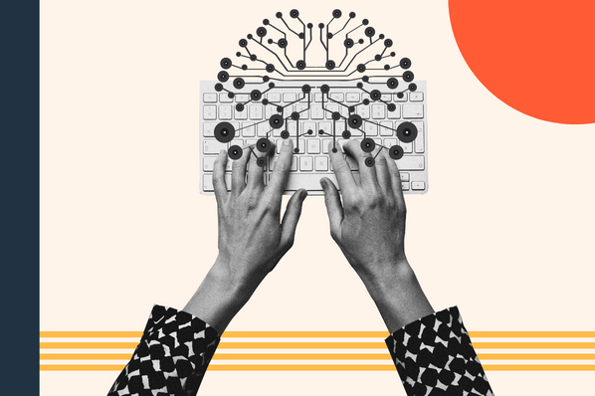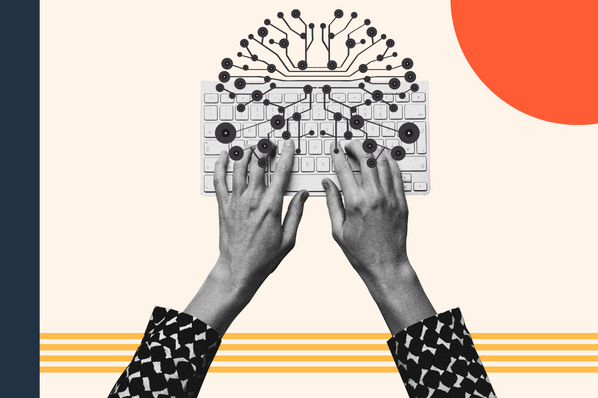If you asked if technology could replace marketing a few decades ago, most would have looked at you like you hit your head on concrete. Now, that’s no longer a question, but one that’s sparking industry-wide debate.

And we owe it to them generative AI wave — which has more implications for the creative sector than many others.
but the question is will AI replace marketers or make us better? And what about SEO? Will Google be replaced by AI chatbots – and what does this all mean for content creation?
To answer these questions, I spoke with Samyutha Reddy, Jasper’s former head of enterprise marketing, to explore her perspectives on what the future holds for AI in marketing and organic search.
Content
How are marketers using AI?
First, let’s consider how generative AI is even being used in marketing.
Marketers surveyed in our State of AI in Marketing 2024 revealed the top tasks they use artificial intelligence for. First on that list are content creation, research, thinking, learning and data analysis.
These tools offer marketers the ability to generate content faster, analyze vast amounts of data with greater precision, and even come up with creative ideas through AI brainstorming sessions. All of this leads to a significant positive return on investment for their efforts.
Yet 48% of marketers in our survey are concerned that AI will replace their jobs in the next few years, while a whopping 69% believe there is a possibility that AI will one day completely replace human beings in the workplace.
But here’s why Reddy and I think it might not happen.
Why AI won’t replace marketing
1. AI augments the human experience (but does not replace the human within that experience).
Generative AI can research any topic online and create original content, formatted as a blog post, email, ad or more, based on queries — and in record time. In the future, instead of needing a team of five or ten content creators, will you need just one — someone to fact-check AI content?
Fortunately, Reddy is not worried. In fact, even though her team was using generative AI on a daily basis, she was still actively hiring and developing her team.

As she says, “AI augments the human experience, but does not replace the human within that experience. We value writers in our society because they are able to give us a human and thought-provoking view of the world.
It is not just about summarizing the facts that exist. It’s about people sharing opinions on very real topics that help build your perspective on how you feel about something. That’s it [tool] it really could never replace that human perspective.”
2. There are still prejudices.
Because generative AI is still in its early stages of development, it is prone to potential biases and inaccuracies that it cannot detect in the information it collects. These biases can lead to skewed results that may not be in line with reality, making it necessary to maintain human oversight in the process.
Reddy highlights this problem, stating, “AI has biases deeply embedded in its human models. AI tends to hallucinate and start talking about random things when you ask it for results, so it would be really hard to completely remove a human from the process.”
This tendency for AI to “hallucinate” or produce irrelevant and sometimes nonsensical content highlights the importance of human intervention to ensure accuracy and relevance.
AI is a tool for marketers, not a replacement
Instead of seeing this technology as a threat, Reddy suggests marketers do this:
“I think the angle you look at matters on this whole generative AI front. If you’re a writer, content creator, or marketer, ask yourself:
Am I going to be someone who embraces technology and figures out how to improve and actually become the top of the crop in terms of talent? Or will I be someone who rejects technology, refuses to believe it’s happening, and clings to the old way of life?”
While AI won’t take your business, you shouldn’t underestimate its impact on your role as a marketer. Here’s how Reddy suggests staying on top of this innovation.
1. Marketers will need to retrain.
As aspects of content creation become more automated, Reddy acknowledges that AI will force content creators to retrain. She told me, “I think it will force content creators to relearn. And I don’t think that’s a bad thing. I think that’s what every big change in technology has done for people.”
She adds, “I’ve never met a content creator who said, ‘Wait. I really want to spend more time doing all the rote tasks of reading everything I need to know on the internet about a given topic.’ AI will give marketers more time to be creative, form opinions and incorporate multiple sources of data into their insights.”
Instead of thinking of AI as a replacement for content creators, it’s better to think of AI as an effective sidekick to marketers.

Consider this: a marketer decides he wants to write a topic SWOT analysis.
Instead of spending the morning drinking coffee and reading about what a SWOT analysis means, effective SWOT analysis examples, and how SWOT analyzes can help businesses grow, she can simply pop a query into an AI chatbot.
After confirming that the sources the chatbot used to pull that information are correct, it can quickly skim through the AI’s response and learn everything it needs to start writing about the topic. She can even use the AI’s response as a first draft and reinforce it with her own unique tone and perspective.
From there, she can use the AI’s proofreading skills to edit her final copy.
Additionally, if a marketer has written a piece of content that they’d like to turn into an entire campaign, they can use AI to reformat their blog post into appropriate ad copy, which they can then hand off to their sales and paid ad teams.
As Reddy says, “I can effectively hand over to sales the entire drip campaign, the entire outbound sequence, complete with landing pages, with ads that people will click and see.
And it really allows me to take back control of what it means to run a campaign. It allows me to really be a project manager and strategist, as opposed to someone waiting for other people to fulfill their end of the bargain.”
57% of our surveyed marketers also admit that they feel under pressure to learn new skills so that AI doesn’t make them irrelevant – and it shows.
2. Marketers will need to become experts in choosing AI platforms.
Freelancing platform Upwork she recently added a new category‘Generative AI’, as a specialty in their market.
That means business leaders can now hire freelance content creators who have expertise with a specific AI platform — and Reddy isn’t surprised.
She continues, “Much like a marketer can advance by becoming HubSpot or Salesforce certified, I think we’ll soon see marketers demonstrating their value by saying, ‘Hey, I’m skilled at using generative AI platforms.’
Reddy sees marketers at the forefront of a tool that will eventually replace all roles in business and believes it is a great privilege to be the first to adopt it.

As she puts it, “I think there’s some power here that marketers can reclaim, and instead of being victims of this story of ‘generative AI is coming because of marketing,’ I think we’re really repositioning it to say, ‘generative AI has landed in the most innovative part of the enterprise: marketing.'”
She continues, “And now we’re stewards of this technology and how it’s going to be used in the enterprise, and we can pilot it and see how it can enhance our work.
And the people who step forward to be stewards of this powerful technology will reap its benefits. I consider myself and our industry extremely fortunate to be in this position.”
But what about search engines?
Far from getting quick answers to common queries, marketers use search engines to perform tasks like SEO optimization to improve website rankings, conduct keyword research to target relevant search terms, and analyze competitors to improve their strategy.
Now, with research being the second most popular use case for marketers using AI, it makes sense that they will use traditional search engines less often.
And even more people are moving in AI search enginestools like HubSpot’s AI Search Grader help marketers optimize their search results.
It’s a free app that quickly analyzes your brand based on what your potential customers see on AI search engines and then gives you actionable recommendations on how to improve.
But what does this mean for traditional search engines? Shouldn’t we, or use, let’s say?
Reddy begs to differ, especially since the information provided to search engines is what drives generative AI results. However, she sees that this is changing drastically.
Nor did she say, “Search can help combat the inaccuracies of artificial intelligence. For example, Jasper has a feature where you can include Google search results.
So if I say, ‘Jasper, help me write a paragraph about XYZ, it will write the paragraph, and at the bottom it will put the Google search results that it used while helping me create that output.
So I have factual links that I can cite and fact-check to make sure they’re the most reliable piece of content on a given topic.”
She continues: “I don’t see the search ever ending. The WILL I see a future where I don’t necessarily want to type things into the search bar, but instead want to use the chat feature. I think it’s inevitable.
And I think we’re already seeing that with the virality of ChatGPT. In just a few days, he became fastest growing consumer app.”

So, will marketing replace AI?
In short, our marketing jobs and search engines are safe — so far, my conversation with Reddy has been positive and uplifting. As marketers, we should not fear AI; We have to embrace it as a technology that will help us do our jobs better.
And, personally, I’m all for any tool that minimizes the amount of time I spend doing rote tasks so I can get back to what’s really important: creating content intended to move, inspire, or challenge readers to think differently.
Think HubSpot isn’t getting in on the generative AI action? Think again. Learn more about our brand new ChatSpot and Content Assistant tools and how you can access them.
Editor’s note: This post was originally published in February 2023 and has been updated for comprehensiveness.
https://blog.hubspot.com/marketing/will-ai-replace-marketing-or-search-engines

![Download Now: The Annual State of Artificial Intelligence in 2024 [Free Report]](https://no-cache.hubspot.com/cta/default/53/b72f2b25-8cc9-4642-9a1b-1e675d3d273b.png)


